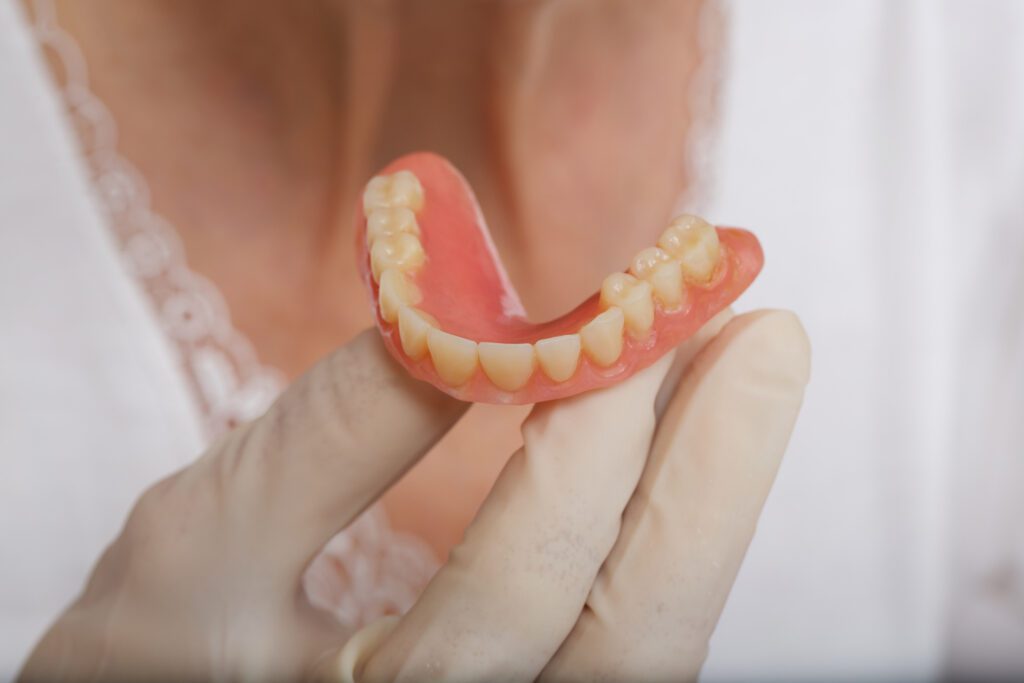Dentures replace rows or arches of missing teeth. These restorative dentistry treatments can be removed and put back into your mouth. Depending on each individual patient’s case, they may receive full or partial dentures. Full dentures are used when all natural teeth are removed from the mouth and replaced with a full set of dentures.

Dentures in Galveston, TX
There are two types of full dentures:
- Conventional Full Dentures – This involves removing all the teeth and allowing the tissue to heal before placing the dentures. It could take a few months for the gum tissue to heal completely, and you will be without teeth during this time.
- Immediate Full Dentures – Before removing your teeth, your dentist takes measurements and has dentures fitted for your mouth. After removing the teeth, the dentist will immediately place the dentures in your mouth. The benefit is that you do not have to spend time without teeth. However, you will need a follow-up visit to refit your dentures because the jaw bone will slightly change shape as your mouth heels. After the jaw bone has healed, the dentures will require tightening.
Partial dentures are another option in our Galveston, TX office when not all your teeth need removal. This is similar to a bridge but not a permanent fixture in your mouth.
Caring for Dentures
Your dentures may take some time to adjust to. The flesh-colored base of the dentures is placed over your gums. Some people say it feels bulky or lacks room for their tongue. Other times the dentures might feel loose. These feelings will affect how you eat and talk for a little while.
Over time, your mouth becomes trained to eat and speak with your dentures, and they begin to feel more and more like your natural teeth. They may never feel perfectly comfortable, but it is much better than the alternative of not having teeth.
Even though dentures are not real teeth, you should care for them like they are. You should brush them to remove plaque and food particles before removing your dentures. After removing them, you should place them directly into room temperature water or a denture cleaning solution.
Never use hot water because it could warp the dentures. Your dentures are delicate, so ensure you are careful when handling them so you don’t drop them. Also, never try to adjust your dentures yourself. You could ruin them, so you should always seek assistance from your dentist if they feel uncomfortable or loose.
Frequently Asked Question
Will I need to use denture adhesives?
Not everyone needs denture adhesives, especially if the dentures fit well. Over time, however, gums and bone may change, and adhesives can help provide extra stability. Our office can guide you on whether adhesive would benefit your specific fit.
Do you have to go without teeth while waiting for dentures?
No, you don’t have to go without teeth. Immediate dentures can be placed on the same day as your extractions, acting as a temporary solution while your permanent dentures are made. These immediate dentures provide function and appearance until your gums heal and the final set is ready.
How long does it take a lab to make dentures?
It usually takes a dental lab about 1 to 2 weeks to make a set of dentures. This process can involve several fittings to ensure the best fit. However, complex cases or custom requests may require more time.
Is it hard to eat with dentures?
Eating with new dentures can take some getting used to. Start with soft foods and gradually work your way up to more solid foods as you become comfortable. Chewing slowly and using both sides of your mouth helps stabilize dentures and makes eating easier.
Is it better to have dentures put in right after extraction?
Immediate dentures, placed right after extractions, can provide the benefit of having teeth right away. However, as your gums heal and shrink, these dentures will likely need adjustments. Some people prefer to wait for their gums to heal fully before getting dentures to ensure the best fit.
Are there any foods I should avoid with dentures?
When you have dentures, it’s best to avoid crunchy, hard foods like nuts, raw veggies, and crusty bread. These foods can dislodge your dentures or cause damage. Sticky, chewy items like caramel and gum can also pull on your dentures. Additionally, very hot foods and drinks can warp the denture material over time, while acidic items like citrus and tomatoes can irritate your gum tissue. We recommend sticking to softer, easier-to-chew foods to keep your dentures secure and comfortable.
Restore Your Full Smile
Call 409-765-7500 for a consultation today. You can also request a dental appointment with the team at Broadway Dental online.
